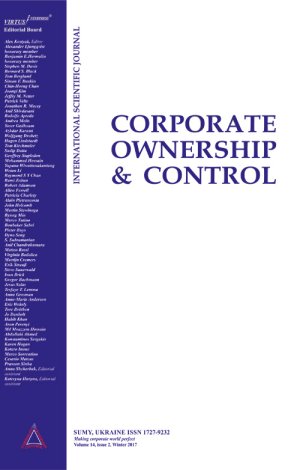
-
 Journal menu
Journal menu

- General information
- Editorial Board and External Reviewers
- Journal Policies
- Publication Ethics and Malpractice Statement
- Instructions for authors
- Paper reviewing
- Article processing charge
- Feedback from stakeholders
- Journal’s Open Access statement
- Order hard copies of the journal
- 50 most cited papers in the journal
DO FIRMS’ LEVERAGE DEVIATIONS AFFECT OVERCONFIDENT CEOS’ ACQUISITION DECISIONS?
Download This ArticleAbstract
In this paper, we examine how an overconfident manager makes an acquisition decision based on whether or not her/his firm is excessively deviated from the target capital structure. In specially, we find that when her firm is overleveraged, overconfident CEO’s are likely to merge relatively smaller firms. Conditional on making acquisitions, overconfident CEOs are less likely to use stock to finance the acquisition, contrary to previous capital structure literature. Furthermore, when her firm is overleveraged, the overconfident CEO is likely to make value enhancing acquisition, since the market reaction, the average 3-day as well as 5-day cumulative abnormal return of the deal announcement, is significantly positive. Overall, our study improves the understanding of the interdependence between capital structure and investment decisions in the present of a managerial behavioural bias. And our study also shows that over-leverage may mitigate the unfavorable effects of managerial overconfidence traits.
Keywords: Leverage, Overconfidence, CEO, Acquisition
How to cite this paper: Chai, Q., Vortelinos, D., Zhao, H. (2016). Do firms’ leverage deviations affect overconfident CEOs’ acquisition decisions?. Corporate Ownership & Control, 13(3), 111-120. https://doi.org/10.22495/cocv13i3p10

















